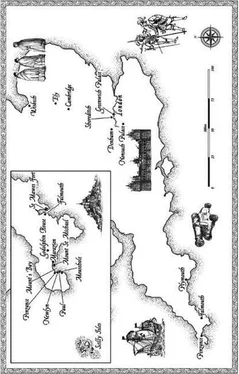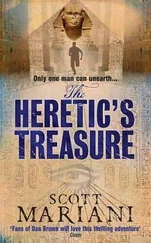Rory Clements - The Heretics
Здесь есть возможность читать онлайн «Rory Clements - The Heretics» весь текст электронной книги совершенно бесплатно (целиком полную версию без сокращений). В некоторых случаях можно слушать аудио, скачать через торрент в формате fb2 и присутствует краткое содержание. Год выпуска: 2013, Издательство: John Murray, Жанр: Исторический детектив, на английском языке. Описание произведения, (предисловие) а так же отзывы посетителей доступны на портале библиотеки ЛибКат.
- Название:The Heretics
- Автор:
- Издательство:John Murray
- Жанр:
- Год:2013
- ISBN:нет данных
- Рейтинг книги:3 / 5. Голосов: 1
-
Избранное:Добавить в избранное
- Отзывы:
-
Ваша оценка:
- 60
- 1
- 2
- 3
- 4
- 5
The Heretics: краткое содержание, описание и аннотация
Предлагаем к чтению аннотацию, описание, краткое содержание или предисловие (зависит от того, что написал сам автор книги «The Heretics»). Если вы не нашли необходимую информацию о книге — напишите в комментариях, мы постараемся отыскать её.
The Heretics — читать онлайн бесплатно полную книгу (весь текст) целиком
Ниже представлен текст книги, разбитый по страницам. Система сохранения места последней прочитанной страницы, позволяет с удобством читать онлайн бесплатно книгу «The Heretics», без необходимости каждый раз заново искать на чём Вы остановились. Поставьте закладку, и сможете в любой момент перейти на страницу, на которой закончили чтение.
Интервал:
Закладка:
Shakespeare was in the front rank, within a few yards of the scaffold, among the noblemen and city aldermen who had come to witness the traitor’s execution. A few yards away, he recognised Lord Mountjoy. The Earl of Southampton was there, too. Shakespeare knew his open secret: like several other nobles, he was a crypto-Catholic. The whole court knew it, but nothing would ever be done about it. Common men and women might die for harbouring priests, but the earl could keep a dozen of them at Southampton House and never once have his peace disturbed by the dread knock of Topcliffe and his pursuivants.
The buzz and roar of the crowd grew louder. Someone called out a paternoster. Shakespeare knew there would be seminary priests and Jesuits here in this press of bodies, all praying for Southwell’s soul and, all the while, hoping to catch a thrown cap or a shred of clothing from the condemned man. The merest drop of spittle or blood could change a man’s life. Henry Walpole had told his questioners that he had decided to become a Jesuit missionary after watching the execution in 1581 of Edmund Campion and being splashed with his blood. Now Walpole awaited his fate in the Tower, broken by Topcliffe’s torture.
The hangman untied Southwell from the hurdle and hauled him up into the back of a cart. The Jesuit looked around at the ocean of expectant faces. His eyes met Shakespeare’s, but then Southwell looked away. Was he searching for some face he knew, perhaps his father or a sister, or a fellow Jesuit?
Without ado, the hangman turned his attention to the condemned man’s clothing and began to loosen the ties of his doublet.
‘May I speak to the people?’ Southwell said in a clear voice.
The hangman stopped his work and stepped back. ‘Yes, speak if you will.’
The huge mass of people hushed. A baby cried and a dog barked, but no one said a word. Every eye with a view was trained on Robert Southwell.
A man shouted out: ‘Hang him and to hell with him. The devil awaits the foul traitor.’
Shakespeare recognised the voice. It was Richard Topcliffe, standing at the far side of the scaffold by the cauldron into which the condemned man’s bowels and heart would be tossed. Beside him stood several of his black-clad pursuivants. When the crowd hushed him, he spat into the ground.
Southwell ignored the interruption and began his speech. He had had many years to prepare these words. He told the crowd that he never intended harm to the Queen and that he had always prayed for her. But his message was not untrammelled, for he made clear that he prayed for her to be brought to the righteous path — the path of the Roman Church.
‘And lastly, I commend into the hands of Almighty God my own poor soul. This is my death, my last farewell to this unfortunate life, and yet to me most happy and fortunate. . I hope that in time to come it will be to my eternal glory.’
Topcliffe’s voice raged out again. ‘He has not begged pardon of the Queen! He has not begged pardon for his treasonous crimes!’
Southwell rocked back and forth. For a moment, Shakespeare thought he would crumple and faint, but he held firm. In a voice that seemed to say, I am tired of this life, it is time to go , he spoke yet again: ‘If I have offended the Queen with my coming to England, I humbly desire her to forget it, and I accept this punishment for it most thankfully.’
And then he called on any Catholics present to pray with him, so that he might live and die a Catholic in the presence of members of his faith.
Topcliffe jumped up on to the scaffold and scowled out into the crowd. His hair was as white as the frost, but his eyes were hot with fury, daring any Catholic to defy him. He tapped his silver-tipped blackthorn cane on the wooden deck of the death place, looking for dissenters.
The hangman moved forward and removed Southwell’s doublet, then pulled back the collar of his shirt. Without bidding, Southwell put his head into the noose. He called on the Mother of God.
‘Blessed Mary, ever a virgin, and all you angels and saints assist me . In manus tuas, Domine commendo spiritum meum . .’
There was no hood. Shakespeare saw no pain in his eyes, only an insistent love and a longing for death.
Topcliffe slapped his stick against the side of the cart and the butchers dragged it forward, leaving Southwell swinging and kicking at air. The only sound was the creaking of the rope and the breeze. Southwell hung there, choking, his neck unbroken. Topcliffe moved towards him, knife in hand to cut the rope and bring him, still alive, to the butchers’ platform so that he might be forced to watch his own evisceration. But Boltfoot Cooper and Shakespeare were already there. Boltfoot clasped the dying man’s body and clung to it, dragging it down to shorten his suffering by hastening death. Shakespeare stood in Topcliffe’s path.
‘Get out of my way, God damn you, Shakespeare, or I will slit you with this dagger.’
Now Lord Mountjoy was at Shakespeare’s side, then they were joined by more noblemen, all standing firm against Topcliffe. A man from the crowd stepped forward and assisted Boltfoot in his act of mercy, choking the life out of Father Southwell until he hung lifeless in their arms. They let him go and he swung, unresisting, in the cold breeze. Quite dead.
Shakespeare stood back. ‘He’s all yours now, Topcliffe. He is gone way beyond your cruelty, I pray to a better place.’
He looked at the frothing torturer with incredulity. He knew he was cruel and brutal. What he had not understood was quite how deranged Topcliffe had become by the gallons of blood that had washed through his fingers. This man should be locked away among the mad and the dangerous.
Topcliffe cut the dead body from the hanging tree and brought it to the platform, where he attacked it with insane ferocity, slavering as he dragged out the entrails. He snatched the axe from the headsman and began chopping the flesh into quarters.
At last he held up the once-beautiful head and shouted, ‘Here is the head of a traitor!’
The crowd was supposed to shout back, ‘Traitor! Traitor!’ But they remained silent. Only the wondering Lord Mountjoy had anything to say, bringing his mouth close to Shakespeare’s ear so that no one else should hear.
‘I cannot answer for the Jesuit’s religion, Mr Shakespeare, but I wish to God that my soul may be with his.’
Jane Cooper held little John in her arms outside the old stone house in Fylpot Street. The boy was two now, and could walk, but he was sickly and weak. She looked down at him, listless in her arms, and mouthed some words of prayer.
Summoning up all her courage, she banged on the door. Boltfoot had forbidden her to come here, calling it a place of magic and necromancy, and declaring they should have none of it. Well, that was fine for him to say, but he had no ideas of his own how to help their son. Anyway, her friend Ellen Fowler had sworn that Dr Forman, who lived in this house, could cure any ill known to man.
‘I don’t know how he does it, Jane, honest I don’t, but I promise you that he makes things right. Whatever ails you. I’d go to him with the pestilence if I had it, and I’d hope to be saved.’
Jane banged on the door again. A boy of about thirteen answered it and glared at her. ‘He’s busy. You’ll have to come back.’
‘When? When can he see me?’
The boy ran his nail-bitten fingers through his straggled hair, and then scratched the front of his grubby hose. ‘When he’s free.’ He went to close the door, but Jane pushed forward.
‘No. I’ve come this far. I want you to tell him I’m here. Then he can tell me to go away if he wishes.’
The apprentice spat into his hands and slicked the hair back from his forehead. ‘Wait here. Don’t come in. He don’t like to be disturbed when he’s about his business.’
Читать дальшеИнтервал:
Закладка:
Похожие книги на «The Heretics»
Представляем Вашему вниманию похожие книги на «The Heretics» списком для выбора. Мы отобрали схожую по названию и смыслу литературу в надежде предоставить читателям больше вариантов отыскать новые, интересные, ещё непрочитанные произведения.
Обсуждение, отзывы о книге «The Heretics» и просто собственные мнения читателей. Оставьте ваши комментарии, напишите, что Вы думаете о произведении, его смысле или главных героях. Укажите что конкретно понравилось, а что нет, и почему Вы так считаете.












